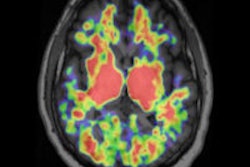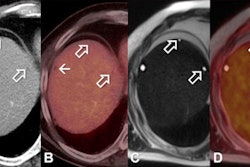Tuesday, December 3 | 11:30 a.m.-11:40 a.m. | SSG01-07 | Room E451A
A study from the Mayo Clinic in Rochester, MN, shows that molecular breast imaging (MBI) provides a relatively low additional false-positive rate compared with other modalities for supplemental screening in women with dense breasts.For noncancer cases, adjunct MBI had a recall rate of 6.7% and a benign biopsy rate of 2.3%. The most common false-positive finding was benign background uptake of technetium-99m (Tc-99m) sestamibi in fibroglandular tissue. The most common biopsied benign lesion was fibroadenoma.
"There are a number of technologies under consideration right now for use in supplemental screening for women who have mammographically dense breasts," said Carrie Hruska, PhD, an associate professor of radiologic physics at Mayo's College of Medicine. "Our data with low-dose MBI showed an impressive increase in cancer detection rate -- supplemental yield of 8.8 cancers per 1,000 women screened -- that is higher than that reported with whole-breast ultrasound or digital tomosynthesis, but does not reach the extremely high cancer detection rate achieved with MRI."
Screening MBI included an intravenous injection of 8 mCi of Tc-99m sestamibi, with bilateral two-view MBI performed with a dual-head cadmium zinc telluride-based gamma camera.
Of 1,638 eligible participants in the study, 1,557 women had no diagnosis of cancer. Of those 1,557 subjects, 105 (7%) had a positive MBI screening result and were recalled for a diagnostic workup.
Among the 105 women, 70 (67%) cases were resolved with benign findings on immediate diagnostic mammogram/ultrasound and follow-up MBI at six months. The remaining 35 (33%) patients underwent biopsy. Pathologic findings included 11 cases of fibroadenoma, six of benign breast parenchyma, and five of fibrocystic change.
In patients who ended up not having breast cancer, supplemental MBI recalled 6.7% and resulted in biopsy for 2.3%. These results are lower than those reported in the American College of Radiology Imaging Network (ACRIN) 6666 trial, where in noncancer cases, supplemental ultrasound recalled approximately 16% and biopsied approximately 6% of patients, and supplemental MRI recalled approximately 33% and biopsied approximately 11%, Hruska said.
"Although this wasn't a head-to-head comparison, our data suggest that supplemental screening with MBI leads to a relatively low false-positive rate compared to other supplemental modalities," she said.




















